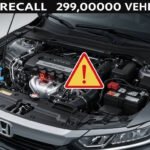In a significant move that highlights the growing challenges of software-dependent vehicles, Honda Motor Company announced in January 2025 a major recall affecting approximately 295,000 vehicles across the United States. The recall stems from a software error in the Fuel Injection Electronic Control Unit (FI-ECU) that can cause engines to stall unexpectedly or lose power while driving, creating potentially dangerous situations for drivers and passengers alike.
Understanding the Technical Issue
According to the National Highway Traffic Safety Administration (NHTSA), the problem is rooted in the electronic control unit that manages fuel injection in several of Honda’s premium and family-oriented models. The software glitch can disrupt proper engine function, leading to intermittent stalling without any warning signs to the driver.
In more severe cases, affected vehicles may experience a complete loss of motive power, which presents a significant safety hazard, especially when occurring at high speeds on highways or in dense traffic situations. Unlike mechanical failures that might provide some warning signs before complete failure, this software issue can manifest suddenly, giving drivers little time to react.
Affected Models
The recall encompasses several recent models from both the Honda and Acura lineups:
- 2022–2025 Acura MDX Type S
- 2023–2025 Honda Pilot
- 2021–2025 Acura TLX Type S
These vehicles represent important segments of Honda’s product portfolio, including luxury SUVs and performance sedans. The common thread among these models is their use of similar engines and fuel control systems that rely on the affected FI-ECU software.
Honda’s Response and Remedy
Honda has responded promptly to the issue, working closely with the NHTSA to implement a comprehensive recall plan. The automaker is offering:
- A complimentary update to the FI-ECU software at all authorized Honda and Acura dealerships
- Official notification letters to all registered owners of affected vehicles, scheduled to begin mailing in March 2025
- Dedicated customer service support to answer questions and facilitate service appointments
In their official statement, Honda emphasized that safety remains their top priority, noting that while the issue is serious, there have been no reported crashes, injuries, or fatalities linked to the software malfunction as of the recall announcement.
Guidance for Vehicle Owners
If you own or lease one of the affected vehicles, Honda and safety experts recommend taking the following steps:
- Verify if your vehicle is included in the recall by checking your Vehicle Identification Number (VIN) through the NHTSA’s recall lookup tool at nhtsa.gov/recalls or through Honda’s owner portal.
- Schedule a service appointment promptly with your nearest authorized Honda or Acura dealership once you receive your notification letter or confirm your vehicle is affected.
- Exercise caution until the repair is completed by:
- Being alert for any signs of unusual engine behavior
- Avoiding extended highway driving when possible
- Maintaining extra following distance in traffic
- Having a plan for safely pulling over if you experience any engine irregularities
- Keep all documentation related to the recall service for your records and potential future reference.
The software update process typically takes less than an hour to complete, though scheduling availability may vary by dealership.
Broader Implications for the Auto Industry
This recall is notable not just for its scale but for what it represents in the evolution of automotive safety concerns. As vehicles increasingly rely on sophisticated software systems to control critical functions, the industry is witnessing a shift in the nature of recalls:
- Software vs. Hardware: Traditional recalls often involved mechanical components that wore out or were improperly manufactured. Today’s recalls increasingly involve code and software integration issues.
- Over-the-Air Update Potential: While this particular recall requires a dealership visit, the incident underscores why many manufacturers are investing in robust over-the-air update capabilities for future models.
- Regulatory Adaptation: The NHTSA and other safety agencies worldwide are developing new frameworks to address software-specific safety concerns in vehicles.
- Consumer Education: As automotive technology evolves, there’s a growing need for better consumer understanding of the complex systems in their vehicles.
Industry analysts note that Honda’s transparent and prompt response to this issue aligns with best practices for maintaining consumer trust while addressing safety concerns.
Looking Forward
The Honda recall serves as another reminder of the complex relationship between advancing technology and automotive safety. While modern vehicles offer unprecedented levels of safety features and convenience, their reliance on intricate software systems introduces new categories of potential failure points that manufacturers must vigilantly monitor and address.
For Honda specifically, this recall represents a significant but manageable challenge. The company’s established service network and experience with previous recalls position them well to address the affected vehicles efficiently.
As the automotive industry continues its march toward increasingly computerized and eventually autonomous vehicles, the lessons learned from incidents like this software-based recall will likely inform better development, testing, and update protocols for the vehicles of tomorrow.
For the most current information about this recall, vehicle owners should contact Honda Customer Service at 1-888-234-2138 or visit Honda’s recall information website.
- Check Your Texas State Vehicle Inspection History Online
- Check out information about: Bearing FAFNIR W209PP Ball BIV Car Fan Motor T-8507.



